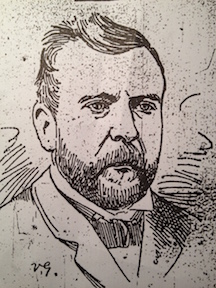from Chris
My latest book, Grant’s Last Battle, focuses on the last few months of Ulysses S. Grant’s life. As he was dying of throat cancer, he was also writing like mad, trying to finish his memoirs before his (literal) deadline.
As I was doing some follow-up research last week, an item caught my eye because of a connection to our kitchen. After all, one of our busiest functions at Stevenson Ridge is Chef Brad’s catering operation. With the many weddings and events we host, Brad is always cooking!
With catering on my mind, it’s little wonder, then, that the following headline caught my eye: “Gen. Grant’s Caterer.”
The headline came from a story in the Albany (NY) Evening Journal on June 20, 1885. Days earlier, Grant had passed through Albany on his way to nearby Saratoga Springs, NY. North of town, he settled into a mountaintop retreat where he’d spend his last month alive.
The story profiled Thomas Cable, “the noted New York restaurateur—his success in his calling—his famous Broadway dining rooms and his hotel at Mt. McGregor.”
Mt. McGregor was the mountaintop where Grant had ensconced himself. The hotel there, the Balmoral, was a joint venture that also included Philadelphia philanthropist Joseph Drexel. Drexel owned a small private cottage next to the hotel that he loaned to the Grant family for their stay so that they would have privacy.
An advertising brochure described the Balmoral as “[a] large, handsome and well-arranged summer hotel, under the capable management of Mr. Thomas Cable” that “affords ample and pleasant accommodations for 300 boarders….” There was also “an elegant restaurant.”
The article from the Evening Journal that profiled Cable offers a delightful glimpse into the past. It paints a quaint enough picture from 1885 New York that I thought I would share:
The senior member of the well-known firm of Cable, Baily & Co., restaurateurs, of 130 Broadway, New York, is one of the most successful men in his line of business in the metropolis. He was born in England in 1838, came to the United States in 1860 and started in the restaurant business in 1867 in the basement of the building in which are not located his roomy and almost palatial dining apartments.
Mr. Cable is a most enterprising man. He is quick to see an opportunity, and the first to avail himself of it. When Coney Island was opened as a summer resort, Mr. Cable was the first man to open a restaurant there, and for a time, while the excitement lasted, money poured in upon him.
His establishment on Broadway, a short distance above Delmonico’s restaurant, presents an interesting sight at the busy hours about midday, when hundreds after hundreds of brokers from Wall Street, cashiers from the surrounding banks, business man, merchants, messengers and clerks all rush in for the noon-day lunch. The establishment extending far back from the street is full of counters for the accommodation of the guests, and the little tables which cluster all about the place are crowded with lunch seekers. A stock brokers ticker occupies a corner, and it is a common sight to see men rush from their meals to the ticker and back again to finish their lunch. A constant stream passes in and out, and it is all that one man can do at the cashier’s desk to make change.
In the front of the establishment are displayed in their season brook trout, sweet breads, speckled salmon, tidbits of all kinds, pastry, meats and delicacies, while at the extreme rear of the place cooks and waiters are running to and fro, hastening to serve the multitude.
Mr. Cable, as his sketch will show, has a face expressing determination, kindness and astuteness. He is small and compactly built, full of sinews and nerves, lithe and active, and his eyes take in everything that goes on about him.
The crow that rushes in is served on the main floor, while in the apartments above, where are more quiet parlors, gentlemen are served at their leisure. Dining accommodations are also offered on the upper floors for ladies and gentlemen, and the place bears a reputation equal to that of Delmonico’s….
The success that has attended the efforts of this firm in New York City, at Coney Island, and everywhere has followed them in the management of the beautiful hotel Balmoral at Mt. McGregor. Form the very day of its opening, the Balmoral has been noted for the excellence of its cooking and for the completeness of the arrangements of the dining-room and kitchen. Of course, a newly opened establishment labors under some embarrassments and is at a disadvantage, but this year the hotel Balmoral will be running as smoothly as any establishment of the kind has ever run, eclipsing if anything the very excellent record if made a year ago. Its patrons are congratulated that they are to be served by so excellent, so industrious and so well-qualified caterers as Cable, Bailey & Co.
Today, the Balmoral no longer exists. A mysterious fire destroyed it in 1897. However, the cottage where Grant stayed still remains and is open seasonally for visitors. Grant Cottage State Historic Site is administered by the state of New York and is run by a robust group of community volunteers, the Friends of Grant Cottage.

